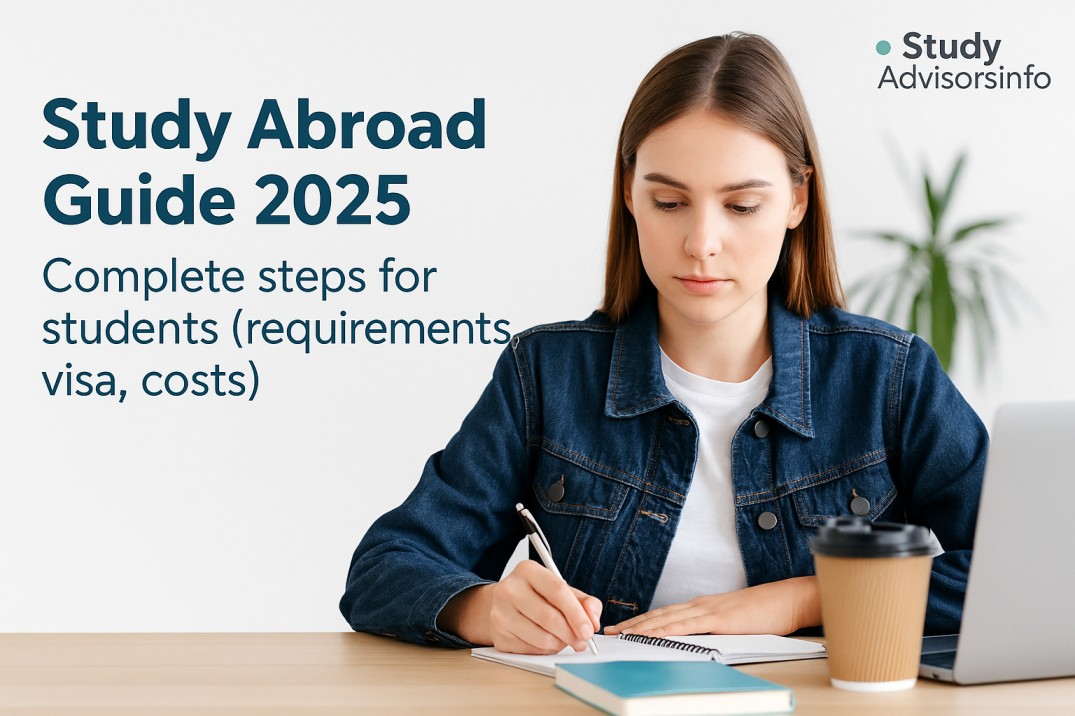So, you’ve been thinking about studying abroad? Maybe you’ve seen friends post pictures from Canada or the UK, or maybe you’ve always imagined walking through the gates of a big international university with a backpack and a dream. The thought is exciting—but also terrifying. Where do you start? What about money? Visas?
Take a breath. This guide is going to break the whole process down into simple steps. No jargon, no sugarcoating—just what you really need to know if you plan to study overseas in 2025.
Why Bother Studying Abroad in 2025?
The obvious reasons are there—you get a degree, you experience another culture, and your CV looks stronger. But in 2025, there’s more to it.
- Countries are competing to attract students. That means better scholarships and friendlier visa policies.
- Employers are hunting for people with international exposure. It shows you can adapt.
- Education has become more flexible—many programs start online, then you continue on campus.
- And let’s be honest, there’s something powerful about stepping out of your comfort zone and figuring out life in a whole new country.
Step 1: Pick Your Country and Course
This decision is half excitement, half confusion. Do you want the innovation of the US, the history of the UK, the affordability of Germany, or the friendly vibes of Canada? Each place has its perks.
- USA: Endless opportunities, cutting-edge research, but pricey.
- UK: Shorter degrees, world prestige.
- Canada: Affordable tuition, immigration-friendly.
- Australia: Sunshine, strong work opportunities.
- Germany/France: Nearly free tuition, especially in public universities.
Now, here’s the thing: don’t pick a country just because it sounds “cool.” Match it to your goals. Want tech? The US. Engineering? Germany. Business? UK or Singapore.
Step 2: Admission Requirements
Every university has its own checklist, but you’ll see these pop up:
- Your transcripts and certificates.
- Proof of language skills (IELTS, TOEFL, or Duolingo).
- Entrance exams (GRE, GMAT, SAT—depends on the course).
- A Statement of Purpose (your story, your “why”).
- Letters of recommendation.
- Sometimes, a portfolio for creative fields.
???? Real talk: Don’t write your SOP in a hurry. It’s not just an essay—it’s your personality on paper.

Step 3: Getting the Visa
Here’s the not-so-fun part. A student visa is basically your permission slip to enter. It feels like a mountain of paperwork, but it’s mostly the same everywhere.
You’ll need:
- A valid passport.
- Your admission letter.
- Proof you can pay fees and living costs.
- Health insurance.
- Visa forms + photos.
Timelines? The US takes a few months, Canada around 2–3 months, the UK lets you apply six months before, and Australia is usually quick.
???? Apply early. No one wants to be biting their nails at the airport waiting for a visa email.
Step 4: Costs (The Scary Bit)
Let’s face it—this is what stops most people. But knowing the numbers upfront helps.
- USA: \$25k–\$55k tuition + \$12k–\$18k living.
- UK: \$15k–\$40k tuition + \$12k–\$18k living.
- Canada: \$13k–\$30k tuition + \$10k–\$15k living.
- Australia: \$20k–\$40k tuition + \$12k–\$17k living.
- Germany/France: Often free tuition, living \$8k–\$12k.
Add in extras like flight tickets, visa fees, health insurance, and books. Hidden costs sneak up fast, so budget 10–15% extra.
Step 5: Scholarships
Now the good part—free money. Scholarships can slash your costs if you hunt early.
- Merit-based: For top grades.
- Need-based: For financial challenges.
- Country programs: Fulbright (USA), Chevening (UK), DAAD (Germany).
- University grants: Many schools have their own aid programs.
Start looking at least a year before. Deadlines creep up fast.
Step 6: Accommodation
This will shape your entire experience.
- Dorms: Convenient, social, but sometimes pricey.
- Shared flats: More freedom, often cheaper.
- Homestays: Great for cultural immersion.
Check safety, transport links, and distance from campus before you sign anything.
Step 7: Life Abroad – The Reality
Here’s what most guides don’t tell you: studying abroad is exciting, but it’s also hard. Homesickness hits. Culture shock is real. You’ll struggle sometimes—but that’s part of the growth.
Some tips:
- Join student clubs—instant community.
- Keep emergency numbers handy.
- Learn to cook a few cheap meals.
- Work part-time if allowed (most countries permit 20 hours/week).
The little adjustments matter more than you think.
Quick Pre-Departure Checklist
- Passport + visa ✅
- Admission letter ✅
- Insurance ✅
- Accommodation confirmed ✅
- Local currency + international card ✅
- Copies of transcripts and certificates ✅

FAQs
1. Can I study abroad without IELTS? Yes. Some universities waive it if you studied in English before. Others accept Duolingo.
2. Which country is cheapest in 2025? Germany and France lead the way for affordability.
3. How early should I apply? Start 12–18 months in advance.
4. Can I work while studying? Yes—Canada, UK, Australia all allow part-time work.
5. What’s the average cost? Roughly \$20k–\$50k per year, depending on where you go.
Final Thoughts
Studying abroad isn’t just about a classroom. It’s about figuring out life on your own, making friends from around the globe, and coming home with stories you’ll tell for decades.
The process looks complicated, but if you tackle it one step at a time—choose your country, meet requirements, sort your visa, plan finances—you’ll be fine.
When you finally land, jet-lagged and nervous, dragging your suitcase through a new city—you’ll realize it was all worth it.







